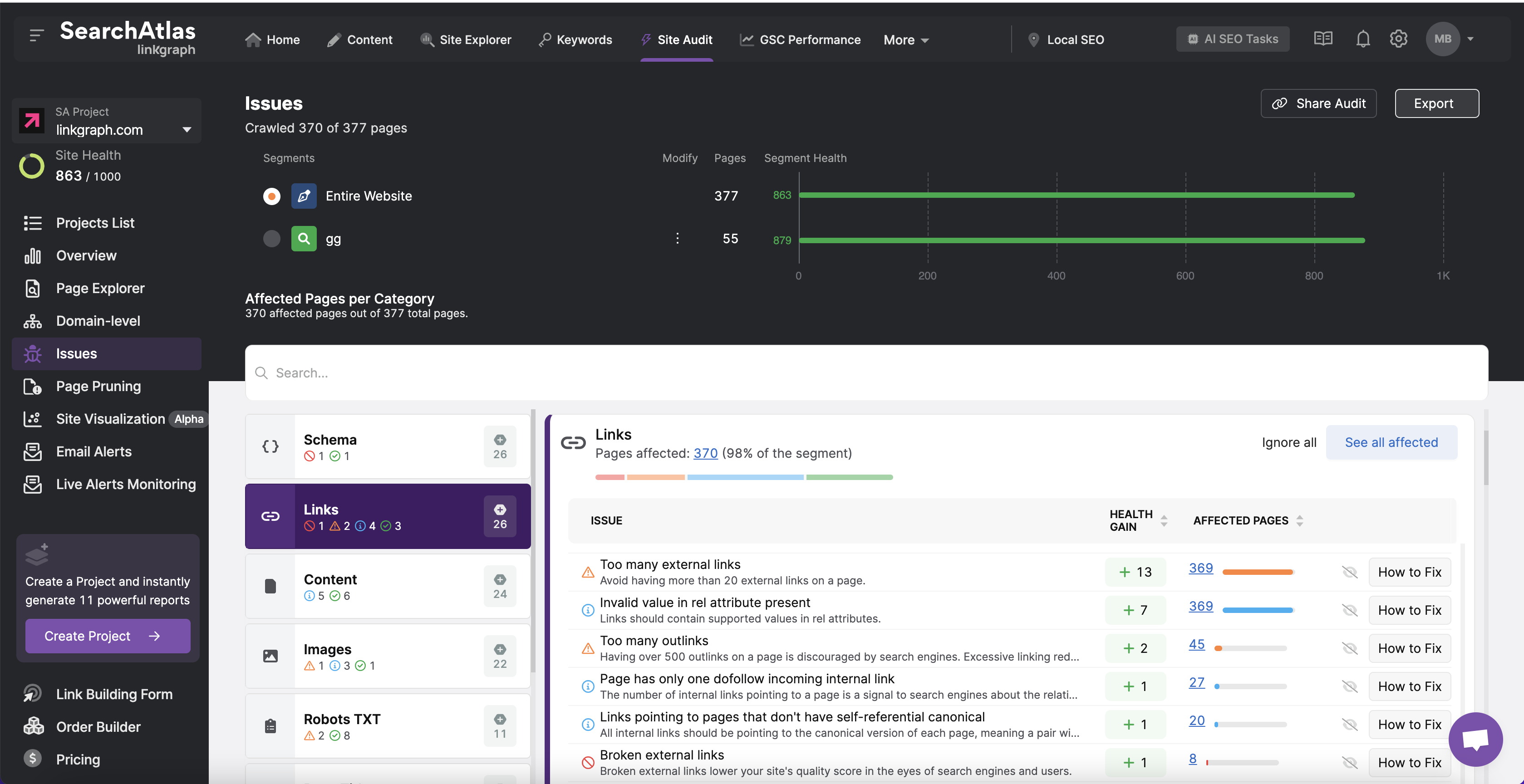What Are Orphan Pages in SEO: Causes, Impacts, and Solutions
One common issue that often goes unnoticed and can impact your search engine rankings is the presence of orphan pages. These pages, isolated from the rest of […]
One common issue that often goes unnoticed and can impact your search engine rankings is the presence of orphan pages. These pages, isolated from the rest of a website due to a lack of internal links, can negatively impact a website’s visibility and hinder its overall performance.
This article will offer an explanation of orphan pages, how they occur, and offer some solutions for how to avoid and resolve them.
What are Orphan Pages?
Orphan pages exist in isolation, meaning no links point to them, leaving them inaccessible to both users and search engine crawlers. The only way to find an orphan page is by knowing the exact url path of the page.
But search engine spiders use links to discover and index new pages. Without any links pointing crawlers to a web page, it is essentially invisible to search engines and will therefore go unindexed. That means zero ability to rank in search results and drive organic traffic
Characteristics of an orphan page include:
- A page that is “live” on the website
- A page with no internal links pointing to it
What Causes Orphan Pages?
So how does a web page become orphaned? Orphan pages can emerge for various reasons, and here are some of the most common causes.
Poor website structure
Poor website structure often results in these types of pages, which are pages that lack links to other relevant sections on the website. Orphans can happen when a new page is created without proper planning and without considering of how it can be connected to other pages. It can also happen when there’s inadequate website organization.
No internal linking
Internal linking is an essential part of on-page optimization. Not only does it help Google discover and index new pages on your website (so they do not become orphaned), but it helps Google understand how your pages are related.
Internal linking, and the anchor text of internal links, is also essential to ranking for specific keywords. An internal link can help Google understand how to pages are different, particularly if they may be topically-related or in the same topic cluster.
Page deletion or migration
When it comes to website redesigns or content reorganizations, one of the most important things to keep in mind is the impact on your site’s internal links and 301 redirects. Specifically, when pages are deleted or moved to a new URL without updating these links, they can become orphaned.
URL canonicalization
Canonicalization is a crucial aspect of search engine optimization that helps improve a website’s ranking and provides a better user experience. Adding canonical tags is the process of selecting a preferred URL for a particular webpage when multiple versions of the same page with different URLs exist. For instance, a website with both “www.example.com” and “example.com” versions can create confusion.
Improper navigation menus
Navigation menus are an essential aspect of any website as they guide users through the site, directing them to the information or pages they seek. However, when these menus are improperly curated, certain pages can become orphaned. When navigation menus fail to include links to certain pages or sections of the site, users may have to rely on other means of searching for them. This can lead to decreased engagement and a higher likelihood of users becoming frustrated and leaving the site entirely.
Do Orphan Pages Impact SEO?
Yes, these pages can have a detrimental impact on SEO. Here’s why:
Reduced visibility
One of the primary factors that make an orphan page bad for SEO is reduced visibility. Reduced visibility is a common issue that many websites encounter due to orphans scattered across their sites. This is particularly true for very large websites with thousands to millions of web pages. Even if you have quality content on these orphan pages, Google cannot index a page unless there is a linking pathway pointing to it.
Diminished authority
Google uses linking patterns as a metric to determine the credibility and relevance of a website. This means that a website that has high-quality links pointing to it from other authoritative sites will most likely rank higher in SERPs than a website with fewer high-quality links. However, the opposite is also true—websites with a lack of internal links tend to lose out on valuable benefits derived from link equity and authority flow.
Without this interlinking strategy, these pages are unable to share in the accumulated authority of the website, ultimately hindering their ability to rank well. Therefore, a comprehensive interlinking strategy, that links back to these pages, is essential to ensure every page on the website has a chance to build authority and contribute to the overall health and ranking of the website.
Wasted crawl budget
Sites like Google have an enormous task of crawling and indexing billions of web pages on the internet every day. As a result, search engine crawlers have a finite amount of time and resources that can be allocated to crawling and indexing web pages. This finite amount of resources is what we refer to as the crawl budget.
Crawl budget waste is a significant issue that many website owners face. One of the main causes of crawl budget waste is orphan pages. These web pages have no incoming links, making them less relevant, and less likely to be crawled and indexed by search engine crawlers.
How to Find SEO Orphan Pages
To identify these pages within your website, you can employ various techniques. Here are a few methods you can use:
Perform a website audit
Performing regular website audits is an essential part of maintaining a healthy and effective online presence. One crucial aspect of a website audit is the manual review of the website’s structure and navigation menus. This involves a thorough examination of the website’s layout, its various sections, and the links connecting them. By analyzing these elements, a manual audit can help identify any issues in the website’s structure that may be hindering its performance.
If you’re a Search Atlas user, simply run an audit in your dashboard to get details on any issues related to internal linking.
Utilizing crawling tools
Tools like Screaming Frog, DeepCrawl, or Sitebulb can crawl your website and generate reports highlighting these types of pages, which can decrease the value of your website in the eyes of search engines. These tools are useful because they provide a comprehensive overview of your website’s internal linking structure. By utilizing these tools, you can identify these orphan pages and then link them to other relevant pages on your website.
Analyze Google Search Console
If you’re looking to boost your website’s SEO performance, Google Search Console is a must-have tool for any webmaster who’s answered the key question of “What are orphan pages?” By providing a myriad of analytics and search data, this platform can help pinpoint issues with your site that are preventing it from ranking higher in search engine results. One of the most useful features of Google Search Console is the Coverage section, which provides a detailed breakdown of your website’s indexation and visibility.
Review analytics data
Review analytics data is an essential component of any digital marketing strategy. It enables website owners and marketers to monitor user behavior and gather insights into their audience’s preferences and needs. Analyzing your website’s analytics data can help identify pages that receive no traffic or engagement, which may indicate the presence of pages that need attention.
How to Fix SEO Orphan Pages
Now that we understand the significance of addressing this issue, let’s explore strategies to fix them:
Internal linking optimization
To optimize your website’s interlinking, it’s important to conduct a thorough review of all pages and ensure each one is adequately linked from relevant sections and related content. This means making sure every indexable page has at least one link pointing towards it from other crawlable pages on the website. This helps search tools understand the structure of your site and how content is related to each other.
Update link structures
Updating link structures is an essential aspect of website migration and restructuring within the realm of answering “What are orphan pages?” When you move or change the structure of your site, you need to consider how your internal links are affected. These links help users navigate your site and they also help search tools understand the relationships between pages. If you do not update your links after restructuring your site, you risk creating orphan pages.
Generate fresh content
Generating high-quality content that naturally incorporates links to these pages is an excellent approach. This approach involves creating fresh and informative content that would link back to these pages from within your site. With this, search tools can easily crawl and index the pages, making them available to your site’s visitors.
Promote through sitemaps
Another solution to address these pages is through the use of sitemaps. A sitemap provides search tools with a comprehensive list of pages on your site, increasing the likelihood that these types of pages will be found and indexed. When creating your XML sitemap, it’s essential to include all SEO orphan pages, so search engines know they exist. By submitting your sitemap to these sites, you’re providing them with a roadmap of your site, allowing them to crawl and index all pages, including orphans.
Conclusion
If you need assistance in resolving orphan pages on your website, consider LinkGraph’s technical SEO services. Our SEO experts can make sure that your web pages are meeting the technical standards required by Google’s ranking algorithm and get any issues resolved quickly.

















































































